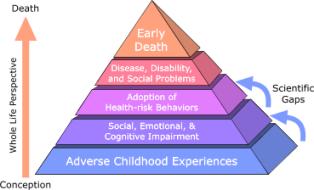ACE Study connects adverse childhood experiences with health and social problems
Tue 19 May 2015
A large United States study is studying the links between adverse childhood experiences and health and social problems. The Adverse Childhood ...

A large United States study is studying the links between adverse childhood experiences and health and social problems. The Adverse Childhood Experiences (ACE) Study examines associations between childhood maltreatment and health and wellbeing later in life.
The ACE Study is ongoing, collaborative research by the Centers for Disease Control and Prevention and the Kaiser Permanente health clinic in San Diego, California. It is a large-scale study of the influence of stressful and traumatic childhood experiences on the origins of behaviours that underlie leading causes of disability, social problems, health related behaviors, and causes of death.
Most previous studies in the area had tended to focus on single types of childhood abuse. In contrast, the ACE Study was designed to simultaneously assess childhood exposure to multiple types of abuse and neglect. For the purposes of the ACE Study, adverse childhood experiences were defined as: emotional, physical, or sexual abuse, emotional or physical neglect, growing up in a household where someone was an alcoholic, a drug user, mentally ill, suicidal, where the mother was treated violently, or where a household member had been imprisoned during the person's childhood. The number of ACE was used to assess the total amount of stress during childhood.
In the initial phase of the study, 17,000 patients of the clinic were provided with a comprehensive physical examination and completed a confidential survey about childhood maltreatment, family dysfunction and current health and behaviours. The study now tracks the health status of the participants.
Two-thirds of participants reported at least one Adverse Childhood Experience (ACE). The study also found ACE tend to come in groups: of the people who reported at least one ACE, 87% reported at least one other ACE. 70% reported two or more others, and more than 50% reported three or more others. Overall, one in five reported three or more ACE.

Of people who reported their mother had experienced violence, 95% reported at least one additional ACE, 82% reported at least two others, 64% at least three others, 48% at least four others and 52% reported five or more additional adverse childhood experiences.
The study found that as the number of ACEs increased, the risk for health problems increased in a "strong and graded fashion." ACEs were not only unexpectedly common, but their effects were found to be cumulative. ACEs were found to be associated with a wide range of health problems including:
|
|
The Centers for Disease Control and Prevention state, "The ACE Study findings suggest that certain experiences are major risk factors for the leading causes of illness and death as well as poor quality of life in the United States. It is critical to understand how some of the worst health and social problems in our nation can arise as a consequence of adverse childhood experiences. Realizing these connections is likely to improve efforts towards prevention and recovery."
The study has published more than 50 scientific articles and held more than 100 conference and workshop presentations. Publications are organised by health outcome and include: chronic disease, reproductive health/sexual behaviour, health risk behaviours, mental health and victimisation and perpetration. There are also publications addressing special populations and methodological issues and publications which provide a study overview and commentary.
Replications of the study, or use of the study questionnaire, are happening in Canada, China, Jordan, Norway, the Philippines and the United Kingdom.
Further resources:
ACESTooHigh is a news site that reports on research and new developments related to adverse childhood experiences. It also covers how people, organisations, agencies and communities are implementing practices based on the research. This includes developments in education, juvenile justice, criminal justice, public health, medicine, mental health, social services, and cities, counties and states.
The Academy on Violence & Abuse have summarised the study in short ACE Study videos available on their website.
The Futures without Violence webinar Trauma-informed Approaches to Domestic Violence Exposure, Adverse Childhood Experiences and Resiliency (Rebecca Levenson, March 2015) explores the latest thinking about ACEs and childhood exposure to domestic violence.
Image: Childhood by Hartwig HKD. Licence: Attribution-NoDerivs 2.0 Generic (CC BY-ND 2.0)
Image: Hartwig HKD


